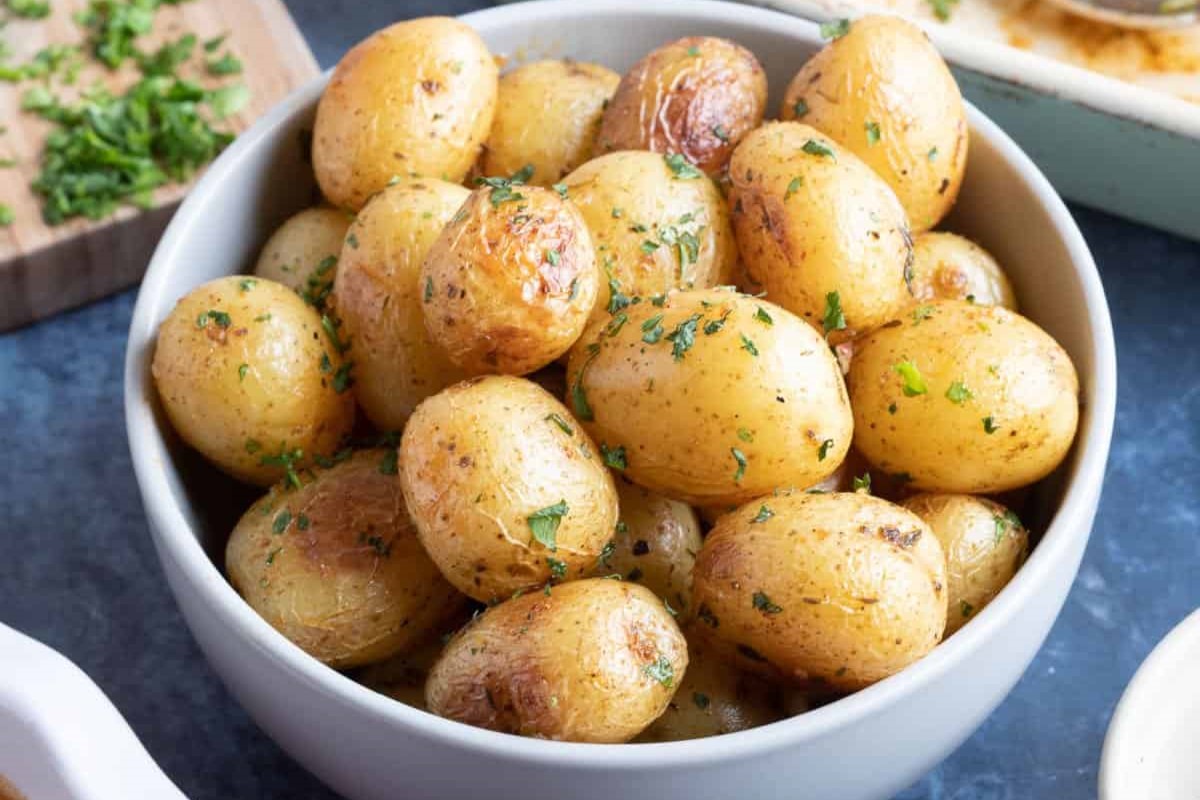
When it comes to versatile and delicious side dishes, baby potatoes are hard to beat. These petite and flavorful spuds are not only a crowd-pleaser, but they also pack a punch when it comes to nutrition. From being a great source of vitamins and minerals to offering a good amount of dietary fiber, baby potatoes have a lot to offer in terms of health benefits.
In this article, we will delve into the 20 nutrition facts about baby potatoes that make them a nutritious addition to your diet. Whether you enjoy them roasted, boiled, or mashed, you can rest assured that you’re getting a nutritional boost with every bite. So, without further ado, let’s explore the nutritional benefits of these delightful small wonders.
Key Takeaways:
- Baby potatoes are a nutritious choice, packed with vitamin C, fiber, and potassium. They are low in calories, fat-free, and versatile for cooking, making them a healthy and delicious addition to any meal.
- With no fat or cholesterol, baby potatoes are a heart-healthy option. They are also gluten-free, high in antioxidants, and provide essential nutrients like iron, magnesium, and B vitamins.
Baby potatoes are a rich source of vitamin C.
These small and delicious potatoes contain high levels of vitamin C, which is beneficial for strengthening the immune system and promoting overall health.
They are low in calories.
One serving of baby potatoes typically contains around 80-100 calories, making them a healthy choice for weight-conscious individuals.
Baby potatoes are a good source of dietary fiber.
They contain significant amounts of fiber, which aids in digestion and helps maintain a healthy digestive system.
They are a good source of potassium.
Potassium is an important mineral for maintaining proper heart and muscle function, and baby potatoes provide a good amount of this essential nutrient.
Baby potatoes are fat-free.
Unlike many other potato varieties, baby potatoes contain no fat, making them a healthy option for those watching their fat intake.
They are rich in antioxidants.
Antioxidants help protect the body against damage from harmful free radicals and reduce the risk of chronic diseases like heart disease and cancer.
Baby potatoes are a good source of energy.
Being a starchy vegetable, they are high in carbohydrates, providing a quick and sustained energy boost.
They contain essential minerals like iron and magnesium.
Iron is crucial for oxygen transportation in the body, while magnesium supports healthy nerve and muscle function.
Baby potatoes are gluten-free.
This makes them a suitable choice for individuals with gluten intolerance or celiac disease.
They have a high water content.
Baby potatoes are composed mostly of water, which helps keep the body hydrated and aids in digestion.
They are a good source of B vitamins.
B vitamins are essential for energy production, nerve function, and cell metabolism, and baby potatoes provide a range of these important nutrients.
Baby potatoes are naturally sodium-free.
This makes them a great choice for individuals looking to reduce sodium intake and maintain a healthy blood pressure level.
They are a versatile ingredient in various dishes.
Due to their small size and tender texture, baby potatoes can be roasted, boiled, mashed, or added to salads and other recipes.
They are low in cholesterol.
Baby potatoes contain zero cholesterol, making them a heart-healthy choice.
They are a good source of folate.
Folate is essential for proper cell division and DNA synthesis, making baby potatoes beneficial for pregnant women.
They are naturally gluten-free.
This makes baby potatoes a safe option for individuals with gluten intolerance or those following a gluten-free diet.
They are an excellent source of resistant starch.
Resistant starch is a type of carbohydrate that acts like fiber, providing various health benefits including improved digestive health and blood sugar control.
Baby potatoes contain no saturated fat.
Saturated fat is known to increase the risk of heart disease, so choosing baby potatoes as a fat-free alternative can contribute to a healthier diet.
They are a good source of antioxidants.
Antioxidants help protect the body against cellular damage and reduce the risk of chronic diseases like cancer and heart disease.
Baby potatoes are a good source of vitamin B6.
Vitamin B6 is essential for brain development and function, as well as the production of red blood cells.
Conclusion
In conclusion, baby potatoes are a delicious and nutritious addition to any diet. Not only are they packed with essential nutrients like vitamins, minerals, and fiber, but they also offer a range of health benefits. Baby potatoes can aid in digestion, support heart health, boost the immune system, and provide energy. They are versatile and can be prepared in various ways, from roasting and steaming to boiling and mashing. Whether you’re looking to add more nutrients to your meals or simply enjoy a tasty side dish, baby potatoes are an excellent choice.
FAQs
1. Are baby potatoes good for weight loss?
Yes, baby potatoes can be included in a weight loss diet. They are relatively low in calories and high in fiber, which can help keep you feeling full and satisfied.
2. Are baby potatoes healthier than regular potatoes?
Both baby potatoes and regular potatoes are nutritious, but baby potatoes tend to be smaller in size and lower in calories. However, the nutritional content may vary slightly depending on the specific variety.
3. How should I store baby potatoes?
It is best to store baby potatoes in a cool, dark, and well-ventilated place, such as a pantry or cellar. Avoid storing them in the refrigerator, as the cold temperature can cause the starches to convert into sugars.
4. Can I eat the skin of baby potatoes?
Yes, the skin of baby potatoes is edible and provides additional nutrients and fiber. However, make sure to wash them thoroughly to remove any dirt or debris before consuming.
5. Can I boil baby potatoes without peeling them?
Absolutely! Boiling baby potatoes with their skin intact not only saves time but also helps retain their nutrients and flavor.
6. Can I freeze baby potatoes?
While it is possible to freeze baby potatoes, it is generally not recommended. Freezing can affect the texture and taste of the potatoes, resulting in a less desirable eating experience.
Was this page helpful?
Our commitment to delivering trustworthy and engaging content is at the heart of what we do. Each fact on our site is contributed by real users like you, bringing a wealth of diverse insights and information. To ensure the highest standards of accuracy and reliability, our dedicated editors meticulously review each submission. This process guarantees that the facts we share are not only fascinating but also credible. Trust in our commitment to quality and authenticity as you explore and learn with us.


